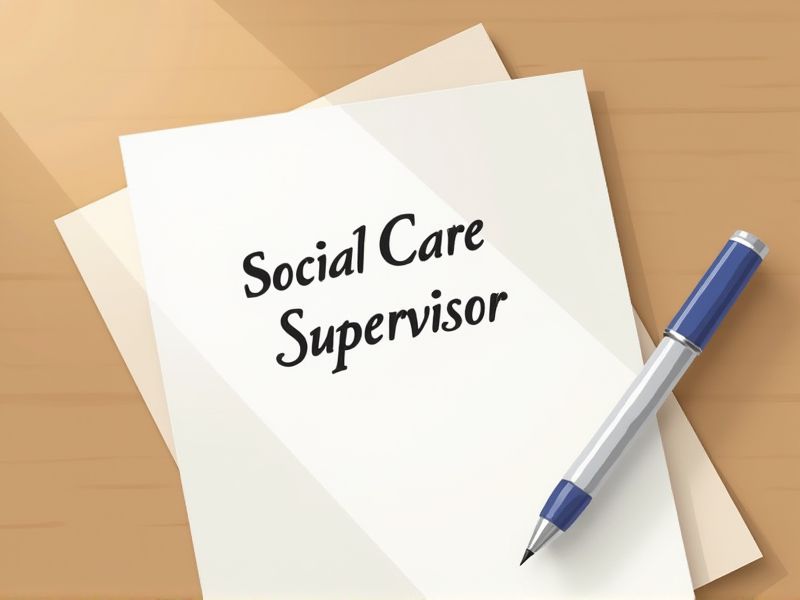
Being a Social Care Supervisor involves oversight of care delivery and staff management, requiring a blend of leadership and practical skills. Certain certifications ensure supervisors are equipped with essential knowledge on regulatory compliance, ethical standards, and effective communication. Certified supervisors can better meet the complex needs of diverse populations and improve care quality. Essential certifications for a Social Care Supervisor include those in leadership, conflict resolution, and care compliance.
NVQ Level 5 Diploma in Health and Social Care Management
The NVQ Level 5 Diploma in Health and Social Care Management equips social care supervisors with essential managerial skills, enhancing their ability to lead teams effectively. It offers in-depth knowledge on regulatory and ethical standards, ensuring supervisors maintain compliance and high-quality care in their practices. The diploma addresses complex problem-solving and decision-making, crucial for handling challenging situations in social care settings. Holding this qualification often leads to improved career prospects and is viewed as a benchmark for professional credibility in the field.
Level 3 Diploma in Health and Social Care
The Level 3 Diploma in Health and Social Care equips supervisors with the essential knowledge to support and manage care teams effectively. This qualification ensures they understand regulatory standards and best practices for providing care. Supervisors with this diploma can identify and implement personalized care plans tailored to the needs of individuals. The credential enhances credibility and trust within the team and among service users.
Care Certificate
The Care Certificate is needed for a Social Care Supervisor because it ensures a standardized level of essential skills and knowledge across the workforce. Implementing this certificate reduces inconsistencies in care quality and enhances trust between staff and clients. Supervisors with this qualification are better equipped to train and evaluate their teams effectively, leading to improved service delivery. This certification also aligns with regulatory requirements that reinforce professionalism in the social care sector.
Safeguarding Adults Certification
Safeguarding Adults Certification equips social care supervisors with essential knowledge to identify and intervene in cases of abuse, ensuring vulnerable adults receive appropriate protection. The certification provides standardized protocols for reporting and handling safeguarding concerns, enhancing the overall quality of care. By obtaining this certification, supervisors signal their commitment to maintaining a safe environment, which can build trust among service users and their families. Legal and regulatory frameworks often mandate such certifications to ensure compliance with national and local safeguarding policies.
Safeguarding Children Certification
Safeguarding Children Certification equips social care supervisors with the knowledge to identify signs of abuse and neglect, ensuring timely intervention. By obtaining this certification, supervisors enhance their ability to create a safe environment for children in their care. It promotes a standardized approach to handling sensitive situations, leading to more consistent and effective responses. This certification also builds trust with families and stakeholders by demonstrating a commitment to children's safety and well-being.
CPR/First Aid Certification
CPR/First Aid certification equips social care supervisors with the skills to respond effectively to medical emergencies, therefore increasing the safety of individuals under their care. In social care settings, clients often have diverse health needs that may require immediate attention, which trained supervisors can address. Knowledge of CPR and first aid fosters a confident and prepared work environment, reducing response time during critical situations. Certification also ensures compliance with many regulatory standards, which are often mandatory for social care facilities.
Manual Handling Certification
Manual handling certification is needed for a social care supervisor because it ensures they understand safe techniques for lifting and moving patients, reducing the risk of injury. Proper training in manual handling contributes to a safer work environment, which can enhance the quality of care delivered to clients. Understanding correct manual handling practices helps supervisors effectively train and guide their teams in safe practices. The certification demonstrates compliance with health and safety regulations, which is crucial for maintaining legal and operational standards in social care settings.
Food Safety Certification
Food safety certification ensures that social care supervisors understand how to prevent foodborne illnesses, which is crucial when managing meals in vulnerable populations. The training equips them with knowledge on proper food storage, handling, and cooking techniques, reducing the risk of contamination. Certified supervisors can enforce strict hygiene standards amongst staff, leading to a healthier environment. Compliance with certification requirements can also protect organizations from legal liabilities related to food safety violations.
Equality and Diversity Training Certification
Social care supervisors with Equality and Diversity Training Certification often cultivate more inclusive work environments, leading to better team cohesion. This certification equips supervisors with the skills to handle diverse client needs, improving the quality of care provided. Knowledge of diversity and equality practices can reduce workplace discrimination incidents, fostering a safer environment for employees and service users. In many regions, compliance with equality standards is legally required, making certification essential for social care staff.
Infection Prevention and Control Certification
Infection Prevention and Control Certification equips social care supervisors with the knowledge to reduce healthcare-associated infections, directly impacting patient safety and health outcomes. Trained supervisors can establish standardized protocols, minimizing the spread of infectious diseases in care settings. Certification enhances the supervisor's competency, fostering trust among staff and residents, which positively affects overall morale and cooperation. Regulatory compliance in social care often demands certified expertise, ensuring that the facility meets legal and ethical standards of patient care.
Summary
When you, as a Social Care Supervisor, earn certifications, your professional credibility tends to increase significantly. Certifications often lead to enhanced skills, allowing you to provide more effective support to your clients. This can result in improved outcomes for those in your care and may open up advanced career opportunities for you. Your organization may recognize your expertise through potential salary increases or promotions.
